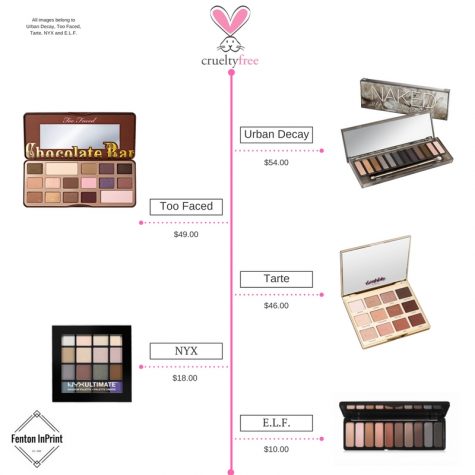Life Over Looks: Animals shouldn’t be tested on for cosmetics
January 19, 2017
In the world of cosmetics, MAC, Bobbi Brown, Covergirl and Maybelline are known for having products that make the users feel more beautiful about themselves. But if consumers knew these cosmetic companies tortured animals to test their products, it should make them feel anything but beautiful.
It is estimated by the Humane Society of the United States that thousands of bunnies, rabbits, rats and guinea pigs are forced into harnesses that keep them from moving as rubbing alcohol and preservatives are injected into their eyes and placed onto their skin and lips. Pain relief is not provided during testing or when the animal is killed. So when undergoing the injections, they feel everything. The chemicals cause corrosion and a burning feeling. Studies are also conducted in which animals are force-fed for weeks or months. During other tests, animals are made to swallow large amounts of a cosmetic to determine the amount that will cause death.
Many people assume that it is not that bad, and the animals are released after they used for testing. This is not the case. According to HSUS, after the tests are over the animals are killed afterward, normally by asphyxiation, breaking of the neck or decapitation.
Still want to use makeup to enhance personal appearance? Luckily, high-end products such as Too Faced, Urban Decay and Smashbox Cosmetics don’t test on animals. The United States doesn’t require animal testing on cosmetics, so these cruelty-free companies ensure safety by using ingredients that have already been used for many years with no complications. Discount brands such as E.L.F., Wet n’ Wild and NYX have also gone cruelty-free.
According to the organization People for the Ethical Treatment of Animals (PETA), reconstructed skin grown from human cells and computerized models that use data to predict the activity of a chemical on skin could be used instead of using animals for testing. So what’s the catch? There isn’t one. The non-animal test methods are cheaper and give the companies quicker results on how their products will affect the consumer. Yet many companies claim that testing on animals will give them better results because they’re testing on living things, even though the lab-created skin copies real human skin.
Consumers can purchase items with the cruelty-free symbol located on the back of the product, write letters or email the companies that test on animals sharing why this is unacceptable and contact lawmakers to support the banning of animal testing and refuse to support companies that test on animals.
Animal testing happens, and unless consumers take steps to stop it, it won’t go away anytime soon. So, are you willing to kill for your eyebrow pencil or liquid lipstick?










